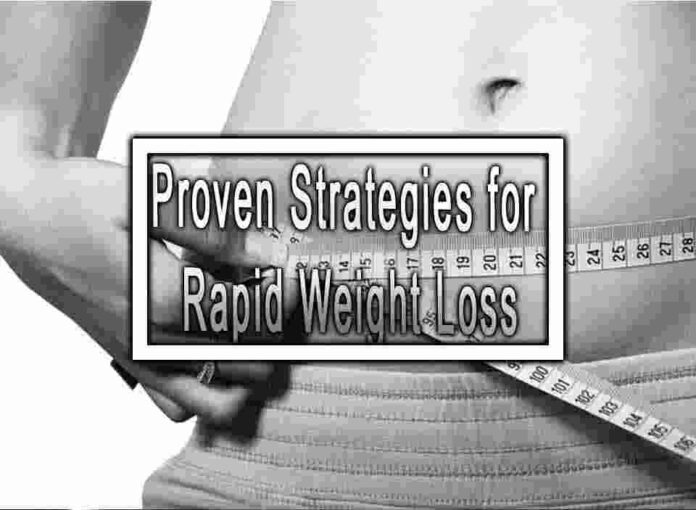While it’s important to approach weight loss in a healthy and sustainable manner, there are strategies that can aid in rapid weight loss. Here are some proven strategies:
1. Calorie Deficit
Create a calorie deficit by consuming fewer calories than you burn. This can be achieved by reducing portion sizes, choosing nutrient-dense, low-calorie foods, and avoiding high-calorie, processed foods.
2. Balanced Diet
Focus on consuming a well-balanced diet that includes lean proteins, whole grains, fruits, vegetables, and healthy fats. This helps provide essential nutrients while keeping you satiated and supporting weight loss.
3. Portion Control
Be mindful of portion sizes to avoid overeating. Use smaller plates and bowls, measure portions, and listen to your body’s hunger and fullness cues.
4. Regular Exercise
Incorporate regular physical activity into your routine. Engage in a combination of cardiovascular exercises (like running, swimming, or cycling) and strength training to burn calories, increase muscle mass, and boost your metabolism.
5. High-Intensity Interval Training (HIIT)
HIIT workouts involve short bursts of intense exercise followed by brief recovery periods. They can help increase calorie burn, improve cardiovascular fitness, and promote fat loss in a shorter amount of time.
6. Drink Plenty of Water
Staying hydrated can help control appetite, boost metabolism, and improve overall health. Drink water throughout the day and before meals to aid in portion control.

7. Limit Sugary Beverages and Alcohol
Sugary drinks and alcoholic beverages are high in calories and offer little nutritional value. Limit their consumption to reduce calorie intake and aid in weight loss.
8. Adequate Sleep
Getting enough quality sleep is crucial for weight management. Lack of sleep can disrupt hormones related to hunger and satiety, leading to increased cravings and weight gain. Aim for 7-9 hours of sleep per night.
9. Track Progress
Keep track of your progress, including weight, measurements, and dietary habits. This helps you stay accountable and make adjustments as needed.
10. Seek Professional Guidance
If you have specific health concerns or significant weight loss goals, consider seeking guidance from a registered dietitian or healthcare professional. They can provide personalized advice and support.
Remember, rapid weight loss may not be suitable or sustainable for everyone. It’s important to prioritize overall health, listen to your body, and consult with a healthcare professional before starting any weight loss program. Sustainable weight loss involves making long-term lifestyle changes that promote a healthy body weight and overall well-being.











